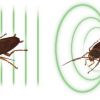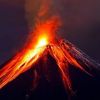-
 +22 +1
+22 +1Long-lasting flow battery could run for more than a decade with minimum upkeep
Researchers from the Harvard John A. Paulson School of Engineering and Applied Sciences (SEAS) have developed a new flow battery that stores energy in organic molecules dissolved in neutral pH water. This new chemistry allows for a non-toxic, non-corrosive battery with an exceptionally long lifetime and offers the potential to significantly decrease the costs of production.
-
 +7 +1
+7 +1World's First Atomic Blast Tests Theories of Moon's Formation
Radioactive glass from the Trinity nuclear test site resembles ancient moon rocks
-
 +38 +1
+38 +1The curious case of cockroach magnetization
The discovery that living and dead cockroaches have strikingly different magnetic properties could help bioengineers design new magnetic sensors.
-
 +39 +1
+39 +1Monkeys and dogs judge humans by how they treat others
Be nice – or your dog may judge you. Both pets and monkeys show a preference for people who help others, and this might explain the origins of our sense of morality. Studies involving babies have previously shown that by the age of one, humans are already starting to judge people by how they interact. This has led to suggestions that children have a kind of innate morality that predates their being taught how to behave.
-
 +41 +1
+41 +1So Many Research Scientists, So Few Openings as Professors
The United States is producing more research scientists than academia can handle.
-
 +39 +1
+39 +1Free Science: NASA Just Opened Its Entire Research Library to the Public
NASA is opening up its research library to the public in the newly launched web database PubSpace…and it’s absolutely free. NASA Chief Scientist Ellen Stofan believes that this move will benefit fellow scientists and engineers and accelerate innovation. “Making our research data easier to access will greatly magnify the impact of our research,” she said. “As scientists and engineers, we work by building upon a foundation laid by others.”
-
 +23 +1
+23 +1Errors riddled 2015 study showing replication crisis in psychology research, scientists say
In a blistering announcement Thursday, scientists at Harvard University and the University of Virginia condemned the results of a 2015 landmark study that concluded more than half of 100 published psychology studies were not replicable. The scientists said the research methods used to reproduce those studies were poorly designed, inappropriately applied and introduced statistical error into the data. The result: a gross over-estimation of the failure rate.
-
 +15 +1
+15 +1IDG Connect How technology can save our endangered animals
As more animals face extinction, new technology and improved partnerships could help provide a solution
-
 +6 +1
+6 +1Synthetic biology startup Lygos raises $13 million from OS Fund and IA Ventures to make cleaner chemicals
Lygos uses microbugs to convert low-cost sugar into specialty chemicals used in manufacturing, and is now releasing a technique to make malic acid, an ingredient needed in the mass production of electronics. To do so, the company announced today it has raised $13 million in Series A funding led by OS Fund and IA Ventures, with participation from First Round Capital, Y Combinator’s Continuity Fund, Fifty Years, Vast Ventures and various angel investors.
-
 +28 +1
+28 +1Our biology wants us untethered. So why does society place so much emphasis on monogamy?
Monogamy is a mystery. A Martian zoologist, visiting Earth and noting our basic biology — not to mention our frequent philandering — would conclude that monogamy is not “natural” to the human species. So why is it so widely promulgated, especially in the modern Western world?
-
 +7 +1
+7 +1Innovative new visualisations are transforming biology
Inventive graphic design and abstract models are helping researchers to make sense of a glut of data.
-
 +26 +1
+26 +1Scientists find proof of volcanoes on the red planet
Scientists discovered the evidence of atleast 2 billion years of volcanic activity on Red Planet. On analyzing the Martian Meteorite, which was found in 2012 in Africa, it is confirms that some of the longest-lived volcanoes in the solar system may be found on the Mars. Moreover, it is found that Volcanoes of the Mars are many times bigger in comparison to volcanoes on Earth. Olympus Mons, the largest Martian volcano, is nearly 27.3 kilometers high. Almost triple the height of Earth’s tallest volcano, Mauna Kea, at 10 kilometers.
Submit a link
Start a discussion





















